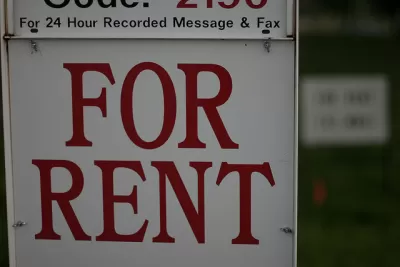Reports about the median rents rising or falling in a community garner a lot of attention, but it's a good idea to understand where the data is coming from.

Daniel Hertz of City Commentary has a warning for journalists using stats about average or median rents in a city—be aware that the information used to compile such statistics may be lacking significant amounts of data. Hertz writes that the numbers can often be skewed due to the absence of listings that never make it to Craigslist or other rental web sites.
For a number of reasons, just taking the average of all the listings you can find is likely to produce extremely skewed results, with numbers much higher than true average home prices. For one, many apartments, especially on the lower end of the market, aren’t necessarily listed in places that are easy to find—or at all. Instead, landlords find tenants with a sign on a fence or streetlight pole, local (and not necessarily English-language) newspapers, or just word of mouth.
Hertz cites the example of a rent report for the city of Chicago compiled by web site Zumper. Zumper's data skews toward the more expensive listings found in just a handful of neighborhoods, while the cheaper rental listings found in other neighborhoods are missing. Why? Hertz believes that the publicly available listings that web sites like Zumper are accessing are those on the higher end of the spectrum: "Zumper takes the median from its listings, without compensating at all for the fact that its listings are disproportionately concentrated in higher-end neighborhoods."
FULL STORY: Journalists should be wary of “median rent” reports

Planetizen Federal Action Tracker
A weekly monitor of how Trump’s orders and actions are impacting planners and planning in America.

Congressman Proposes Bill to Rename DC Metro “Trump Train”
The Make Autorail Great Again Act would withhold federal funding to the system until the Washington Metropolitan Area Transit Authority (WMATA), rebrands as the Washington Metropolitan Authority for Greater Access (WMAGA).

The Simple Legislative Tool Transforming Vacant Downtowns
In California, Michigan and Georgia, an easy win is bringing dollars — and delight — back to city centers.

The States Losing Rural Delivery Rooms at an Alarming Pace
In some states, as few as 9% of rural hospitals still deliver babies. As a result, rising pre-term births, no adequate pre-term care and "harrowing" close calls are a growing reality.

The Small South Asian Republic Going all in on EVs
Thanks to one simple policy change less than five years ago, 65% of new cars in this Himalayan country are now electric.

DC Backpedals on Bike Lane Protection, Swaps Barriers for Paint
Citing aesthetic concerns, the city is removing the concrete barriers and flexposts that once separated Arizona Avenue cyclists from motor vehicles.
Urban Design for Planners 1: Software Tools
This six-course series explores essential urban design concepts using open source software and equips planners with the tools they need to participate fully in the urban design process.
Planning for Universal Design
Learn the tools for implementing Universal Design in planning regulations.
Smith Gee Studio
City of Charlotte
City of Camden Redevelopment Agency
City of Astoria
Transportation Research & Education Center (TREC) at Portland State University
US High Speed Rail Association
City of Camden Redevelopment Agency
Municipality of Princeton (NJ)




























